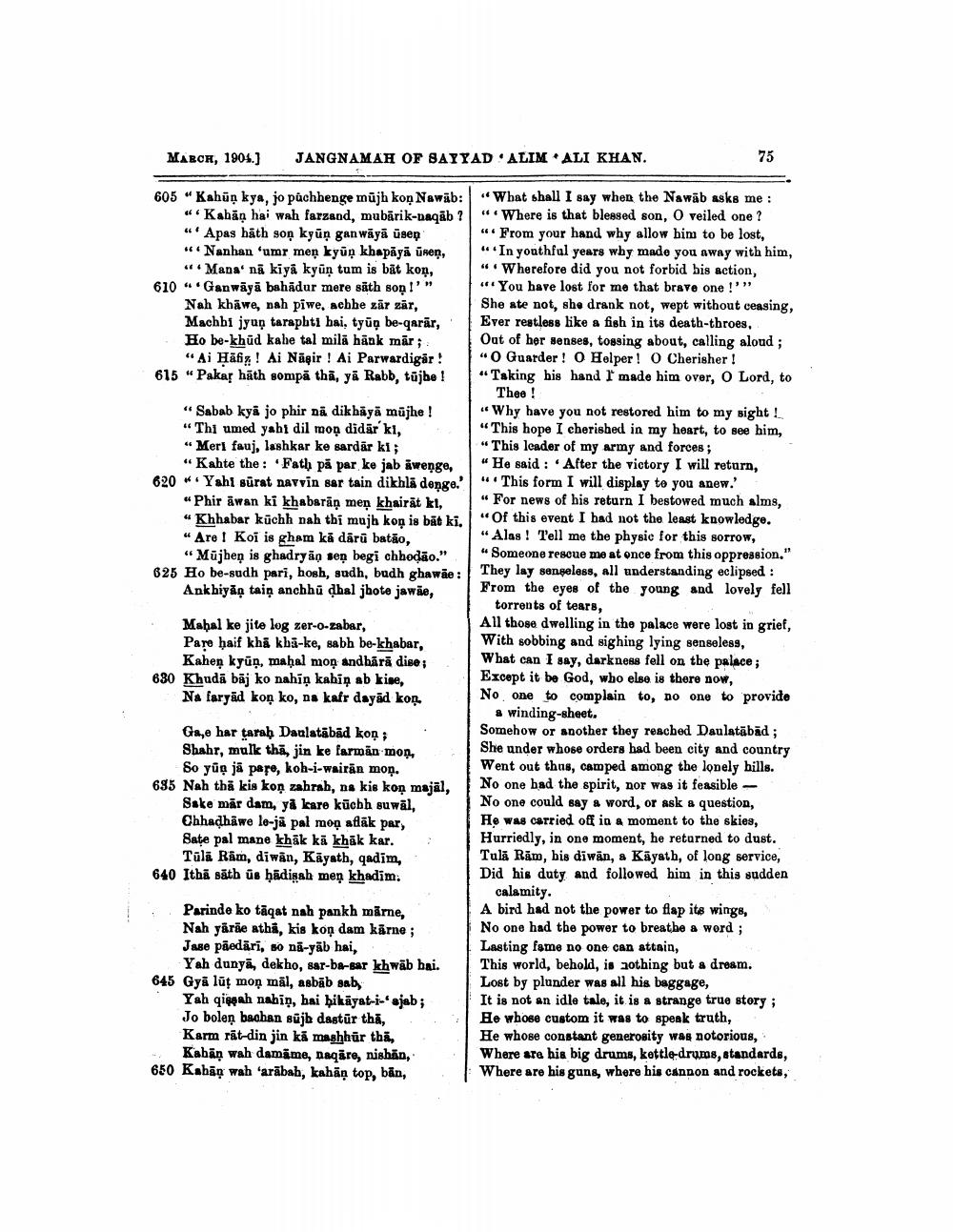________________
MARCH, 1904.]
605 "Kahun kya, jo puchhenge mujh kop Nawab: "Kahan hai wah farzand, mubarik-naqab? Apas hath son kyun ganwāyā useņ Nanhan 'umr men kyun khapāyā useṇ, "Mana' nā kiya kyun tum is bāt koṇ, 610Ganwaya bahadur mere sath son!'"
Nah khawe, nah piwe, achhe zar zār, Machhi jyun taraphti hai, tyun be-qarar, Ho be-khud kahe tal mila hänk mar;
JANGNAMAH OF SAYYAD ALIM ALI KHAN.
"Ai Hafiz! Ai Nagir! Ai Parwardigar ! 615 "Pakar hath sompa tha, ya Rabb, tujhe!
"Sabab kya jo phir na dikhāyā mujhe ! "Thi umed yahi dil mon didar ki, "Meri fauj, lashkar ke sardar ki; "Kahte the Fath på par ke jab awenge, 620 Yahi surat navvin sar tain dikhla denge.' "Phir awan ki khabaran men khairat kl, "Khhabar kuchh nah thi mujh koņ is bāt ki. "Are! Koi is gham kā dāru batão,
"Mujhen is ghadryan sen begi chhodão." 625 Ho be-sudh pari, hosh, sudh, budh ghawae: Ankhiyan tain anchhu dhal jhote jawãe,
Mahal ke jite log zer-o-zabar, Pare haif kha kha-ke, sabh be-khabar, Kahen kyun, mahal mon andhārā dise; 630 Khuda baj ko nahin kahin ab kise,
Na faryad kon ko, na kafr dayad kon.
Ga,e har tarah Daulatābād kon; Shahr, mulk tha, jin ke farman mon, So yun jā pare, koh-i-wairan mon. 635 Nah tha kis kon zahrah, na kis kon majal, Sake mar dam, ya kare kuchh suwal, Chhadhawe le-ja pal mon aflak par, Sate pal mane khāk kā khāk kar. Tula Ram, diwan, Kayath, qadim, 640 Itha sath us hadisah men khadim.
Parinde ko taqat nah pankh marne, Nah yäräe atha, kis kon dam kārne; Jase paedāri, so na-yab hai,
Yah dunya, dekho, sar-ba-sar khwab hai. 645 Gya lut mon mal, asbab sab,
Yah qiggah nahin, hai hikayat-i-' ajab; Jo bolen bachan sujh dastur tha, Karm rat-din jin kā mashhur tha, Kahan wah damame, naqäre, nishan, 650 Kahan wah 'arabah, kahan top, ban,
"What shall I say when the Nawab asks me : "Where is that blessed son, O veiled one?
From your hand why allow him to be lost, "In youthful years why made you away with him, "Wherefore did you not forbid his action, "You have lost for me that brave one!"" She ate not, she drank not, wept without ceasing, Ever restless like a fish in its death-throes, Out of her senses, tossing about, calling aloud; "O Guarder! O Helper! O Cherisher ! "Taking his hand I made him over, O Lord, to Thee!
75
"Why have you not restored him to my sight! "This hope I cherished in my heart, to see him, "This leader of my army and forces;
"He said: After the victory I will return, "This form I will display to you anew.'
66
For news of his return I bestowed much alms, "Of this event I had not the least knowledge. "Alas! Tell me the physic for this sorrow, "Someone rescue me at once from this oppression." They lay senseless, all understanding eclipsed: From the eyes of the young and lovely fell torrents of tears,
All those dwelling in the palace were lost in grief, With sobbing and sighing lying senseless, What can I say, darkness fell on the palace; Except it be God, who else is there now, No one to complain to, no one to provide a winding-sheet.
Somehow or another they reached Daulatābād ; She under whose orders had been city and country Went out thus, camped among the lonely hills. No one had the spirit, nor was it feasibleNo one could say a word, or ask a question, He was carried off in a moment to the skies, Hurriedly, in one moment, he returned to dust. Tula Ram, his diwan, a Kayath, of long service, Did his duty and followed him in this sudden calamity.
A bird had not the power to flap its wings, No one had the power to breathe a word; Lasting fame no one can attain,
This world, behold, is nothing but a dream. Lost by plunder was all his baggage,
It is not an idle tale, it is a strange true story; He whose custom it was to speak truth, He whose constant generosity was notorious, Where are his big drums, kettle-drums, standards, Where are his guns, where his cannon and rockets,




